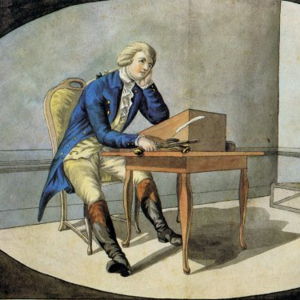
Overview
Synopsis
The young, melancholic poet Werther falls madly in love with the married Charlotte, but she is betrothed to another man. He obsesses over her, writing her letters constantly. Charlotte tries to convince Werther to forget her and to move on and find another love, yet Werther refuses as he can only think of loving Charlotte. Although Charlotte urges Werther to leave for a few months and not see her to help him move on, Werther returns months later filled with an even greater passion for Charlotte. Upon his return her realizes that Charlotte does loves him, but fighting her feelings, she still refuses Werther. It is this final refusal that leads Werther to commit suicide, leaving Charlotte deeply depressed. Werther’s passionate love for Charlotte has been enrapturing audiences for centuries, and is consistently one of the most performed operas in the world each year.
Show Information
Context
The opera Werther is loosely based on the novel The Sorrows of Young Werther by Johann Wolfgang von Goethe. While written in French, it received its premiere at the Vienna Court Opera on February 16, 1892, with a German translation by Max Kalbeck. It received its French language premiere in Geneva later that year, and wasn’t performed in France until January 1893. The role of Werther was originally written for tenor, but Massenet did adjust the role so that a baritone could sing it in 1902.
to read the context for Werther and to unlock other amazing theatre resources!Plot
ACT 1
It is July, Le Bailli is sitting in his garden surrounded by six of his children and he is trying to teach them a Christmas carol. He rebukes them for singing poorly and says that if their older sister Charlotte were here they would sing it much better. Hearing Charlotte’s name, the children immediately begin to sing better (“Noel, Noel”). The Bailli’s friends, Schmidt and Johann, come by and remind Le Bailli to join them later for a social evening. Sophie, Charlotte’s 15-year-old
to read the plot for Werther and to unlock other amazing theatre resources!Characters
| Name | Part Size | Gender | Vocal Part |
|---|---|---|---|
|
Lead |
Male |
Tenor |
|
|
Lead |
Female |
Mezzo-Soprano |
|
|
Supporting |
Male |
Baritone |
|
|
Supporting |
Female |
Soprano |
|
|
Supporting |
Male |
Baritone |
|
|
Featured |
Male |
Tenor |
|
|
Featured |
Male |
Baritone |
|
|
Ensemble |
Male |
Baritone |
|
|
Ensemble |
Female |
Mezzo-Soprano |
|
|
Ensemble |
Either Gender |
Soprano |
Songs
ACT 1
- Prelude
- Noel, Noel - Le Bailli, Les Enfants
- Bravo pour les enfants! - Le Bailli, Johann, Schmidt, Sophie
- Je ne sais si je veille - O nature pleine de grace - Werther
- O spectacle ideal d’amour et d’innocence - Werther, Charlotte, Le Bailli, Sophie, Les Enfants
- Quelle priere de reconnaissance - Albert
- Clair de lune - Orchestra
- Il faut nous separer - Ah! Purvu que je voie ces yeux - Charlotte, Werther
- Mon ame a reconnu votre ame - Werther
- Vous avez dit vrai! - Si vous l’aviez connue - Charlotte
- Reve, extase - Werther
ACT 2
- Prelude
- Vivat Bacchus! Semper vivat - Johann, Schmidt
- Voici trois mois que nous sommes unis - Charlotte, Albert
- Un autre est son epoux! J’aurais sur ma poitrine presse la plus divine - Werther
- Mais celle qui devint ma femme - Albert. Werther
- Du gai soleil plein de flamme - Sophie
- Nous parlions du bonheur - Albert
- Ah! Qu’il est loin, ce jour - Charlotte, Werther
- Lorsque l’enfant revient d’un voyage - Werther
ACT 3
- Prelude
- Qui m’aurait dit la place que dans mon coeur - Charlotte
- Ces Lettres!...ces lettres!...je les relis sans cesse! - Charlotte
- Mais...souffres-tu? - Sophie, Charlotte
- Ah! Le rire est beni - Sophie
- Va! Laisse couler mes larmes - Charlotte
- Seigneur Dieu! J’ai suivi ta loi! - Charlotte
- Oui! C’est moi! - Pourquoi cette parole amere? - Werther, Charlotte
- Pourquoi me reveiller, o souffle du printemps? - Werther
- Ciel! Ai-je compris? - Werther
- Non, vous ne me verrez plus! - Charlotte
- Prends le deuil, o nature! - Werther
- Werther est de retour - Albert, Charlotte
ACT 4
- Premier Tableua
- Symphonie: La Nuit de Noel
- Deuxieme Tableua (2nd)
- Non! Non! C’est impossible, - qui parle? - Charlotte, Werther
- Oui...du jour meme ou tu parus - Charlotte
- La-bas, au fond du cimetiere - Werther
- Noel! Noel! Jesus vient de naitre - Les Enfants
A song with an asterisk (*) before the title indicates a dance number; a character listed in a song with an asterisk (*) by the character's name indicates that the character exclusively serves as a dancer in this song, which is sung by other characters.
Monologues
Scenes
Key Terms
Sorry! We do not currently have terms for this guide.
Videos
Quizzes
Themes, Symbols & Motifs
Sorry! We do not currently have learning modules for this guide.
Quote Analysis
Sorry! We do not currently have learning modules for this guide.
